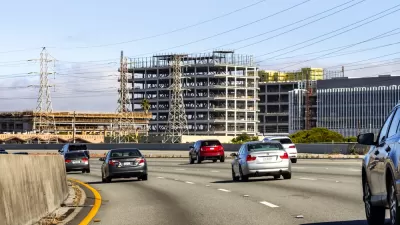The nation’s largest home builder could receive approval for a 530-unit development under an obscure state law as the city of La Habra’s zoning laws hang in limbo after the state rejected its proposed housing plan.

With local zoning laws suspended for cities that haven’t had their housing plans approved by the state of California, home builders are beginning to file applications for projects under the “builder’s remedy,” a 1990 law that lets developers bypass city council review and skirt local zoning laws if 20 percent of units in a proposed project are available to low-income renters. Jeff Collins reports on one project for the Orange County Register.
After having one application denied in the city of La Habra, Lennar Corp., the largest home builder in the United States, has filed a new application for a 530-unit development on the site of a 151-acre golf course. If approved under the builder’s remedy, the project could be exempt from Measure X, a local measure passed in response to Lennar’s original application that requires voter approval for rezoning open space.
As Collins explains, “The builder’s remedy was meant to serve as one of numerous consequences for failing to meet state housing laws, which require cities and counties to promote homebuilding at all income levels.” But local activists say the community should have a say in what gets built.
If approved, “the project still would have to comply with the California Environmental Quality Act, or CEQA, which likely would require an environmental impact report.” The new proposal includes more housing units and less open space than the original plan.
FULL STORY: Lennar defies La Habra’s Measure X, files what could be ‘builder’s remedy’ application

Maui's Vacation Rental Debate Turns Ugly
Verbal attacks, misinformation campaigns and fistfights plague a high-stakes debate to convert thousands of vacation rentals into long-term housing.

Planetizen Federal Action Tracker
A weekly monitor of how Trump’s orders and actions are impacting planners and planning in America.

San Francisco Suspends Traffic Calming Amidst Record Deaths
Citing “a challenging fiscal landscape,” the city will cease the program on the heels of 42 traffic deaths, including 24 pedestrians.

In U.S., Urban Gondolas Face Uphill Battle
Cities in Latin America and Europe have embraced aerial transitways — AKA gondolas — as sustainable, convenient urban transport, especially in tricky geographies. American cities have yet to catch up.

Detroit Says Problems With Property Tax Assessments are Fixed. Advocates Disagree.
With higher-valued properties under assessed and lower-valued properties over assessed, advocates say there's still a problem with Detroit's property tax system.

Defunct Pittsburgh Power Plant to Become Residential Tower
A decommissioned steam heat plant will be redeveloped into almost 100 affordable housing units.
Urban Design for Planners 1: Software Tools
This six-course series explores essential urban design concepts using open source software and equips planners with the tools they need to participate fully in the urban design process.
Planning for Universal Design
Learn the tools for implementing Universal Design in planning regulations.
Heyer Gruel & Associates PA
JM Goldson LLC
Custer County Colorado
City of Camden Redevelopment Agency
City of Astoria
Transportation Research & Education Center (TREC) at Portland State University
Jefferson Parish Government
Camden Redevelopment Agency
City of Claremont





























